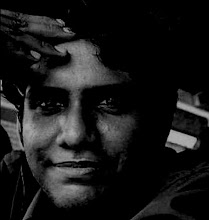The day didn't start like any other day. I awoke at half past six in the morning, about four hours earlier than my usual wake up time. I had to meet Prof. Navjyoti Singh and we were to go to a temple nearby. To me he looks a lot like a wide-eyed Albert Einstein. We had to meet and go to a place nearby called Nanakramguda. We met at the mess, we being Prof. Navjyoti, two of my colleagues, a wise man who was visiting us- Ravindra Sharma (affectionately known as guruji) and myself. We set off after breakfast.
Prof. Navjyoti and guruji went together on my colleague's bike and me and my two colleagues were to get there, the three of us on my bike, Thumpy. Thumpy is more than capable of carrying three people but the problem was that all 3 of us were fairly big built so I had to make two trips to take both of them there. Once all of us were there, we proceeded to enter the temple. I usually do not enter temples, this time I don't know why I felt compelled to enter. And we had a chat with the head priest. He told us that the temple we were standing in now was the new one, they had to change it cos the old one had gone into disrepair. And the new structure was approximately 400 years old. We got blessings and we put on our footwear and walked into the temple garden adjacent to the well. There we sat, lit up and talked about society and the caste system and the problem of untouchability.
The place was serene, and full of greenery. Here and there through the trees we could see the glass and chrome of these really tall buildings that housed multi-national corporations- software companies. The contrast was bordering on irony. Here we had this sanctuary of serenity, spirituality and sanity amid this hustle and bustle of “modernity”. This was the first time I had been to a temple that my family was not connected to. Even the famous Tirupati temple had on its board of trustees a member of my extended family. All these factors, my being an outsider to this temple, it being more than 400 years old, my being there with two men of great wisdom and the contrast between this temple and its surroundings, made it feel really surreal to me.
When the clock struck 10, we decided we had to leave as Prof. Navjyoti had a class to take and I had a class to prepare for. At half past eleven, I headed off for my class. A friend of mine, Devansh was to make a presentation on Searle's Chinese Room Experiment, an experiment in artificial intelligence. The presentation was under the auspices of my professor and research guide Prof. Bipin Indurkhya.
The night before, I had a conversation with Devansh about the presentation and suggested a minor change that would enable him to get his point across slightly more lucidly. That did help to a certain extent, but a point after that again let the class descend into a non-terminating loop of question and answers, to me the questions that prevented the loop from terminating seemed naïve. For some reason I glanced back from my position in the front row of the class and I saw that the director of our university Prof. Rajeev Sangal had also come to listen to what Devansh had to say. I would like to think I had a premonition of what was to come.
Seeing that the class had entered a non-terminating loop, Prof. Bipin came forward and pointed out a few lacunae in our arguments and our understanding of certain things. He split the class into two groups- the Dualists (those who believe that the mind and body are two separate things , and some of them believe that the mind can never be understood), and the Monists (those who believe that the mind and body are indistinguishable and inseparable from each other, I belonged to this group). During his talk, Prof. Rajeev said he wanted to bring a point up, he took Prof. Bipin's place at the chalkboard and started speaking about the gap that sometimes exists between theory and observation.
We observe phenomena, and based on our observations, we formulate a theory. But if we ever encounter an observation that does not fit into our theory, he said that if we choose to ignore the observation for the sake of maintaining our theory we would be acting unscientifically. To elucidate, Prof. Sangal talked about seeing the external world and understanding it and that external data comes from our senses and that data is used to observe the world. At this point, Prof. Bipin countered by saying that there is no seeing and that there is not external world, it is all a representation within our own minds, furthermore it is not the sense organs that perceive the world but it is our brain that does all the perceiving.
This argument sparked of a scientific-philosophical debate of a magnitude that dwarfed my premonition like a planet dwarfs a person. I was watching two philosophies collide. Prof. Bipin is a monist, and Prof. Rajeev's talk was leaning towards dualism. I had become unaware of every other person in that class. Even their attire, Prof. Rajeev in a traditional kurta and trousers and Prof. Bipin in his usual shirt and shorts had an effect on my perception of this debate
Prof. Rajeev then talked about a hypothetical robot that can feel pain. And then he asked that when the robot's limb was pricked or subjected to some other stimulus, and the robot felt pain, which part of the robot felt it? This added a whole new dimension to the philosophical argument.For some reason, I felt that this was in invalid question.
Imagine watching a tennis match between Roger Federer and Bjorn Borg (the two greatest tennis players in my opinion). Only they were not human sized, they were super giants of astronomical size with unlimited reserves of energy and stamina, and instead of a ball, they were hitting at each other the 10 dimensional multi-verse. That was what this debate was like.
It was a clash between what seemed to be the sum of the classical theories in AI and the radical new theories championed by Cognitive Science. The class started at half past 11 and was to end at 1 but it overshot that time by half an hour and only that much because the professors said that the time is up. We wanted it to continue. We were hungry, some of us were tired, but we wanted to continue listening to this debate.
Were were talking about robots and computers, programs and circuits, but the real issue on the table was whether it is possible to understand what it means to be human. Whether it is possible to understand the human condition. Whether we are justified in approximating the function of the human brain to that of a highly complex computer. This was a debate on whether it was possible to understand the nature of the ultimate truth about ourselves.
I left the class shell-shocked. I had just been witness to a once in a lifetime event and I was reeling from the effect. I headed to lunch, where I met Prof. Navjyoti. I told him that he should have been part of the debate, as he is a professor of philosophy. The next class, after lunch was creative writing, I usually enjoy this class but today, because of the magnitude of the events that I had been through, was unable to involve myself in the class.
In the evening I only remember taking bath because my mind was wandering. I had had only 2.5 hours of sleep the previous night, I was not fatigued but I was totally mentally preoccupied. I was completely unaware of what I did till dinner time. This was the first time I had a lapse in memory without having to take marijuana.
After dinner, there was yet another meeting with guruji, I was waiting for 2030 when the meeting would begin. The first people there were Prof. Rajeev and his daughter Sapna, a good friend of mine. While I was trying to recount to her the events that transpired in the class today, Prof. Rajeev asked me what I liked about the class. I remember saying that I liked the philosophical nature of the debate and also that it showed us how people argue in academic circles regarding theories and philosophies.
Prof. Navjyoti, Prof. Sangal, guruji, two other professors, and five or six of us research scholars were part of the discussion that evening. It was mostly about society and how modernization is not always good and how traditionalism is not always bad. We talked about a few cases where certain tribal societies had been ruined because of modernization and how how traditionalism had helped keep the society intact, safe and vibrant. And how certain traditions are in place only to make sure that all members of a society have a sense of belonging and involvement.
An evening spent in the company of wise learned men, in conversation about the matters affecting today's society and life in general. We also talked a little about how the resources afforded us by modernity (technology, knowledge, etc.) could be used to make a better society.
The conversation on sociology, and the philosophical debate earlier that day and the visit to the temple at the start of the day, all three of those events are sure to leave lasting events in my mind. Each of these events enabled me to understand each other event in a way I have never seen them before.
The meeting began at 2030 and ended close to 2300. However towards the end of the meeting my sleep deprivation caught up with me and I dozed off for a while. But all in all that day the 28th of October, 2009, yesterday, was the best day of my life so far.







